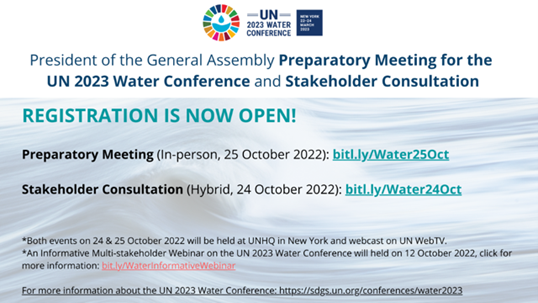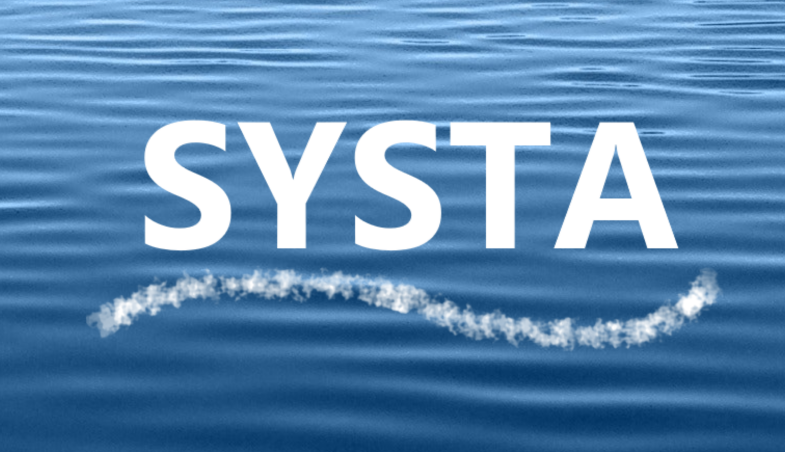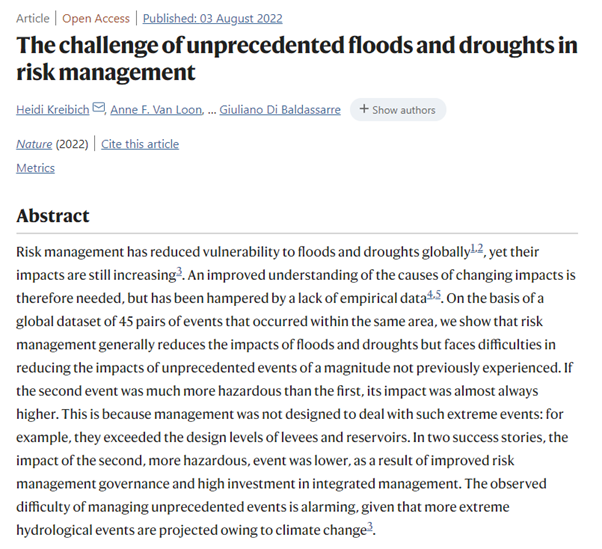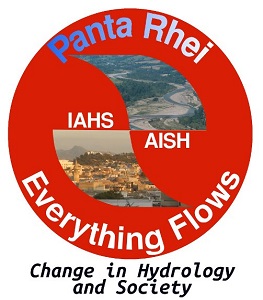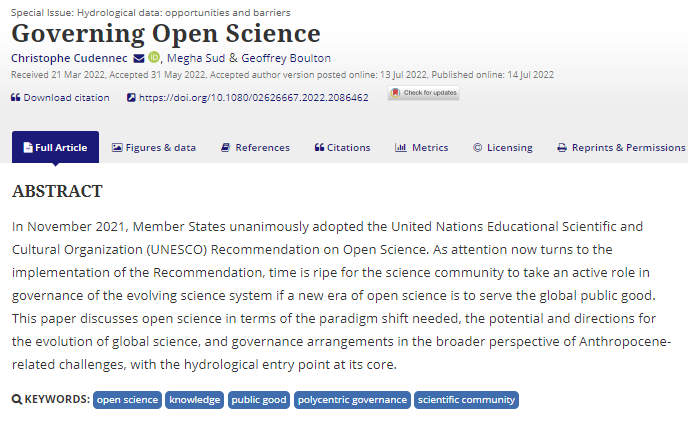IAHS News
Preparatory Meeting for the UN 2023 Water Conference and Stakeholder Consultation
The IAHS would like to share with you that the registration is now open for the one-day preparatory meeting which will be convened by the President of the UN General Assembly on 25 October 2022, from 10am – 6pm (EDT) at the UNHQ in New York. The aim is to finalize the themes of the interactive dialogues and other outstanding organizational matters of the UN 2023 Water Conference. The meeting is for in-person participation only but will be live streamed on UN WebTV.
Additionally, to ensure the meaningful participation of all relevant stakeholders, the preparatory meeting will be preceded by a hybrid stakeholder consultation on 24 October 2022 in which scientists are encouraged to participate.
Please click here for registration and more information.
Applications are invited for Sivapalan Young Scientists Travel Awards to attend IUGG 2023
Applications are invited for the IAHS SYSTA (SIVAPALAN YOUNG SCIENTISTS TRAVEL AWARDS) towards the costs of participating in the IAHS programme at the IUGG 2023 General Assembly - Berlin, Germany during 12-16th July 2023.
Full details of the SYSTA eligibility criteria and application procedure can be found at: https://iahs.info/About-IAHS/SYSTA.do
Applications will be considered from hydrologists that meet ALL of the following criteria:
- They grew up and now reside in a financially disadvantaged country.
- They are registered for a PhD, or completed their PhD less than 5 years ago (an extra year per child is allowed for parents if they took parental leave).
- There is evidence of their high quality/high potential as a scientist in the form of a paper of which they are first author in Hydrological Sciences Journal (HSJ) or Proceedings of the International Association of Hydrological Sciences (PIAHS) (or in another listed hydrological journal).
- They have not previously received a SYSTA award for intercontinental travel.
- They will be giving a presentation at the meeting.
Applicants must have submitted an abstract for the IUGG 2023 General Assembly. The maximum award value is 2500 euros.
Applicants should simultaneously apply for an IUGG 2023 travel grant https://www.iugg2023berlin.org/travel-grant/
The closing date for SYSTA applications for upcoming IUGG 2023 General Assembly is 12 noon (GMT) on 6 December 2022.
IUGG 2023 Registration and abstract submission are now open
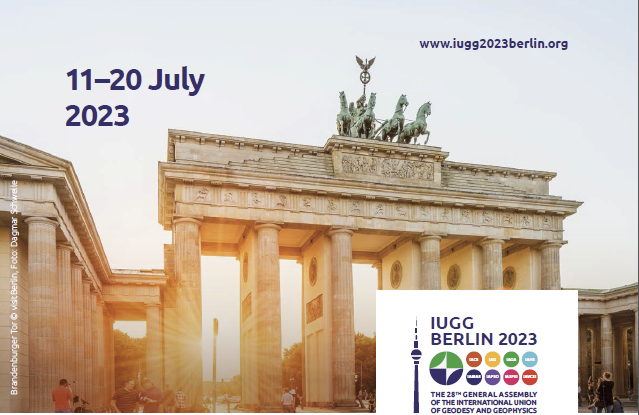
The International Union of Geodesy and Geophysics (IUGG) is comprised of eight Associations including IAHS. The IUGG General Assembly is held every four years and offers an opportunity to have IAHS-specific, inter-Association and Union symposia.
The 28th IUGG General Assembly will be held July 11-20, 2023 at the CityCube in Berlin, Germany. This is a special opportunity for participants from around the world to come together and share their science and culture. Join us for a host of scientific activities, including special public lectures, keynote Union lectures and a wide variety of themed sessions.
Abstract submission and online registration are now open on the website:
Registration: https://www.iugg2023berlin.org/registration-guidelines/#
Abstract submission: https://www.iugg2023berlin.org/abstract-submission/
Submission of a travel grant application: https://www.iugg2023berlin.org/travel-grant/
The IAHS-led programme will be over the first half of the Assembly ie 12-16 July 2023.
Details of the IAHS symposia can be found here:
IAHS standalone symposia: https://www.iugg2023berlin.org/825-2/
Inter-Association symposia led by IAHS: https://www.iugg2023berlin.org/922-2/#IAHS
and several other symposia led by sister associations with an IAHS involvement and hydrological perspective: https://www.iugg2023berlin.org/922-2/#
IAHS Union Lecture will be given by Luz Adriana Cuarta https://www.iugg2023berlin.org/union-lecturers/
We look forward to welcoming you to Berlin in 2023.
For additional information please contact [email protected]
2023 Election of Officers of IAHS - Application Deadline 11 Jan 2023
Applications are now sought for the roles of IAHS Bureau and Commission Officers. For full information, and how to apply for a position, see the Election of Officers page on the IAHS website.
The officers of the IAHS Bureau and Commissions are elected every 4 years at the General Assembly of the International Union of Geodesy and Geophysics (IUGG). Next elections will be held in IUGG2023 in Berlin, 11-20 July during the IAHS Plenary Administrative Session (exact date to be decided, between 12 and 16). Countries, which are IUGG members at the time, have one vote each. IAHS would like to draw attention to the following roles which are available for election (application by 11 Jan 2023):
-
For the Association: President Elect (to become President after two years), 3 Vice Presidents, Secretary General
-
For each of the ten International Commissions: President Elect (to become President after two years), 3 Vice Presidents, Secretary.
IAHS is an inclusive association and all hydrologists of the world participating in the work of the Association are entitled to stand as candidates for these positions, with the exception of the candidate for the President-Elect of the Association who shall be a citizen or resident of a country adhering to the IUGG.
For full information, and how to apply for a position, see our Election of Officers webpage.
Call For Abstracts for FRIEND-Water Global conference 2023
The IAHS would like to draw your attention to the the Call for Abstracts for FRIEND-Water Global Conference 2023.
As a flagship initiative of the UNESCO Intergovernmental Hydrological Programme (IHP), which puts science to action for a Water Secure World, FRIEND-Water contributes to research on:
- regional water resources,
- hydrological extremes (drought and floods),
- climate resilient water adaption,
- as well as water education and capacity building.
Every four years, a world conference is held to bring together all the scientists involved to discuss the challenges of research on these issues.
The new edition will take place from 5 to 10 June 2023 in Dakar, at the University of Cheikh Anta Diop.
The abstract submission campaign runs from 15 October to 15 November 2022. For more information, go to Global FRIEND-Water 2023 International Conference for the submission form and information note on the call for abstract.
IAHS-ICWQ International Workshop on Flood-drought chain disasters and water ecological degradation in a changing environment
The International Commission of Water Quality (ICWQ) of IAHS have organised a workshop on 'Flood-drought chain disasters and water ecological degradation in a changing environment' in Zhuhai City, Guangdong Province, China on 9-12 December 2022.
With climate change and rapid urbanization, precipitation and runoff show a more concentrated distribution trend. The extreme water conditions of flood and drought disasters are aggravated. More frequent flood-drought alternations have been seen in some countries as a result of global climate change and intensive human activities. Water ecology degradation especially in developing countries is still serious. The purpose of this workshop is to investigate the new characteristics and new laws of flood and drought disasters and water ecological degradation in the changing environment through invited presentations. Scientific strategies and practical measures for flood-drought early warning and disasters prevention and water ecology protection in a changing environment will be discussed.
Topics (not limited to):
1. Intelligent monitoring of hydrology and water resources and water ecology for early perception of water risk
2. Extreme evolution of hydrology and water ecology in changing environments
3. Flood-drought-aquatic ecology modeling and risk early warning
4. Flood and drought disasters and drought-flood conversion risks
5. Water ecological responses to human activities and climate change
6. Storm surge - heavy rain - flood - waterlogging - ecological degradation "multi-encounter" and its derivative disaster occurrence mechanism
7. Simulation, prediction and assessment of flood and drought disasters and their derivative composite disasters
8. Mechanism of water ecological degradation and restoration and governance
Important Dates:
* Deadline for abstract submission: 20 November 2022.
* Abstract of no more than 300 words should be sent to Dr. Zhiyou Liu [email protected]
Panta Rhei publication in Nature
IAHS would like to draw your attention to the open access publication in Nature lead by Heidi Kreibich, Chair of the Panta Rhei Working Group.
The challenge of unprecedented floods and droughts in risk management
Just because you haven't experienced something, doesn't mean it can't happen. This insight also applies to natural hazards such as floods and droughts. A study published in the renowned scientific journal Nature has shown that gearing risk management measures to the worst-case event experienced to date is not enough to reduce impacts from unprecedented events.
Floods and droughts can cause severe damage and are on the rise in many parts of the world. The impact of such natural hazards can be reduced through appropriate risk management if the causes of the increasing damage are known. However, this has so far been hampered by a lack of empirical data.
A large-scale international collaborative effort by researchers from the International Association of Hydrological Sciences (IAHS), led by Heidi Kreibich of the German Research Centre for Geosciences (GFZ), has now led to important lessons from past events. A unique data set of two successive extreme flood or drought events in the same area was compiled and studied. Regions with large differences in population structure, socio-economic, climatic and hydrological conditions on all continents were studied. The analyses confirmed the assumption that appropriate risk management generally helps to reduce damage.
However, it is particularly difficult to reduce the impact of extreme events whose magnitude has not been seen in the past in the affected area. Heidi Kreibich explains this with two factors. First, infrastructures such as dams and reservoirs have an upper design limit up to which they are effective, but once a threshold is exceeded, they become ineffective. Second, risk management is usually introduced or adjusted reactively after major floods and droughts, while proactive, anticipatory strategies are rare. The reason for this behaviour is partly due to a cognitive bias related to the rarity and previous uniqueness of these extreme events, as well as to the nature of human risk perception: events that one has already experienced oneself are more likely to be expected again in the future.
Two success stories were also examined, in which the damage was less despite a higher hazard in the second event. Three success factors were identified: effective governance of risk and emergency management, high investment in structural and non-structural measures, and improved early warning and real-time control systems. Heidi Kreibich says: "We believe that applying these success factors can counteract the current trend of increasing damage from extreme events under climate change conditions."
https://www.nature.com/articles/s41586-022-04917-5
Open Science publication in Hydrological Sciences Journal
First author, Christophe Cudennec, elaborates on his experience as Secretary General of IAHS, part of IUGG, member of ISC. The publication of this article in Hydrological Sciences Journal, the Journal of IAHS, demonstrates how a century-old scientific community offers a reflexive space, and how open science developments can benefit from engaging with and springboarding from the existing self-organized structures of the scientific community. Along with COVID-19-related developments, we place the discussion of open science in the context of long-term and accelerating challenges of the Anthropocene, within which the hydrological entry point provides a key aspect and illustration based on the connecting and interfacing dimensions of water in nature and societies; the increasing role of water in security issues; and the diversity of water-related contexts and epistemologies across the world.
The article is open access and available at https://www.tandfonline.com/doi/full/10.1080/02626667.2022.2086462
ICCE2022 Abstract Submission Deadline now July 31st
The international conference "River sediment quality and quantity" by the Continental Erosion Commission (ICCE) of International Association of Hydrological Sciences (IAHS) will be held at Bydgoszcz in Poland, at the Kazimierz Wielki Univeristy, on October 17-21, 2022 in Bydgoszcz (hybrid formula). The deadline for abstract submission is July 31st.
The conference program will include oral and poster thematic sessions within the following topics: Sediment quantity - cascades, budgets, yields; Sediment impacts on river channel hydromorphology and managment; Sediment quality - geochemistry, nutrients, contaminants, emerging issues; and Sediment-biota interactions.
The conference program will include: Oral and poster thematic sessions (hybrid version) and Social events for the offline participants (a post-conference tour is planned for the sediment management project in the Vistula River estuary and the construction of Vistula Spit canal (official name Nowy Swiat ship canal) which is a constructed canal across the Polish section of the Vistula Spit that will create a second connection between the Vistula Lagoon and Gdansk Bay)
The updated flyer of conference is:
https://icce2022.ukw.edu.pl/jednostka/icce2000/downloads
The conference is eligible for SYSTA awards to pay the registration fee for remote registration (on-line). An abstract must be accepted before application for an award.
WMO Hydrological Research Strategy – call for research proposals
As a partner organisation IAHS would like to draw your attention to the WMO call for research proposals.
WMO through its Hydrology Coordination Panel is seeking to fund research proposals that will address aspects of one or more of the three research priorities identified by the WMO Hydrology Research Strategy, contributing to build the capacity of WMO Members in the hydrological value chain. These aspects are:
1. Improve Hydrological Monitoring to generate hydrologic and cryospheric information that enhances our understanding and assessment of the quantity and quality of water resources, including both surface and groundwater. This includes both issues related to hydrologic data collection, and to the design and evaluation of hydrological monitoring networks.
2. Improve hydrological forecasting, including hydrological and cryospheric modelling and forecasting; precipitation estimation and forecasting; understanding and predicting hydrological extremes; and assessing/modelling human-water-ecosystem interactions.
3. Develop and improve relevant methods, procedures, and techniques for the collection, analysis, and transmission/communication of hydrological data for the user community. This includes issues related to data processing and quality control; data storage, access, and dissemination; and communications to the end users.
Additional background information and modalities are provided in the WMO Hydrology research call for proposals
Submit your proposal
Proposing entities willing to submit a proposal should comply with the WMO Hydrological Research Strategy Proposal template, and submit it by 30 September 2022 using the email address [email protected] with following subject : WMO Hydrological Research Strategy – research proposal
Received proposals will be evaluated by an external Technical Evaluation Board with representatives from WMO, UNESCO-IHP and IAHS.

